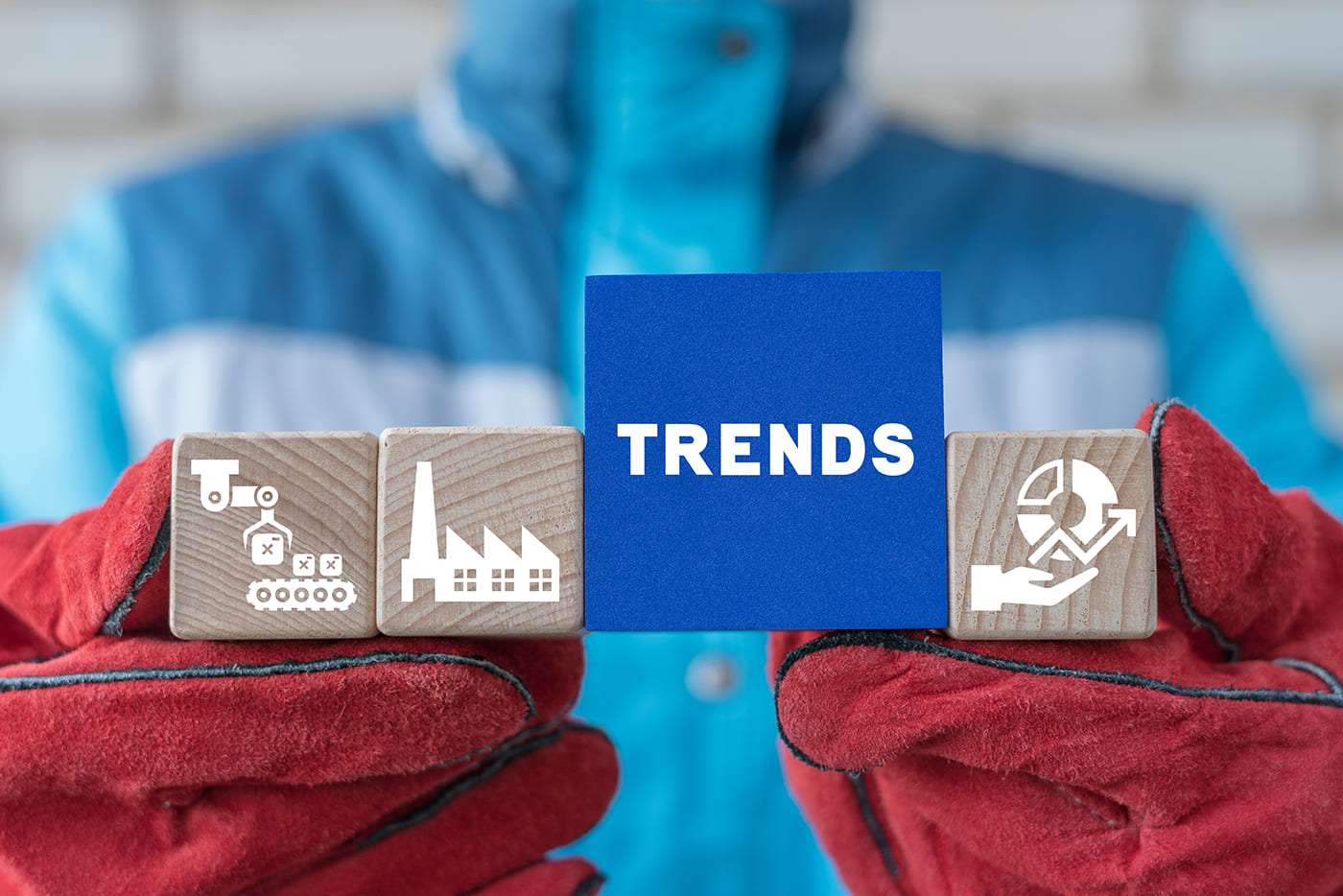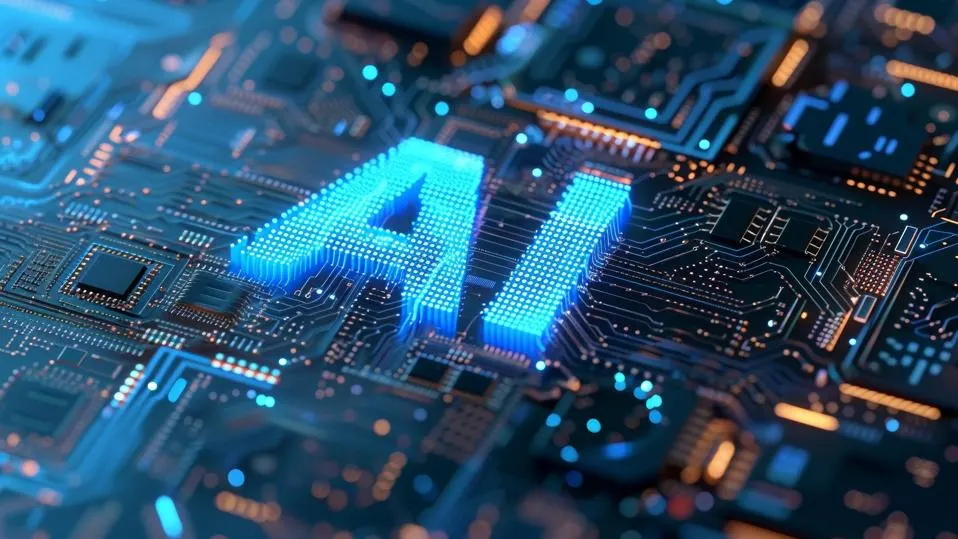The Top 5 Manufacturing Trends In 2023
11 April 2023
Global manufacturing and industry are still reeling from the disruption of recent years, with supply chain and workforce disruption still key issues. At the same time, the world is heading into a period of unprecedented economic uncertainty. On the face of it, this seems to suggest slowing growth and declining profits are on the cards. However, those who can successfully navigate these challenges while leveraging the opportunities offered by automation, artificial intelligence (AI), and other pillars of the “fourth industrial revolution” to drive innovation and modernization have everything to gain. With this in mind, here are my predictions for what will be the most important trends across manufacturing and industry over the coming year.

Investing in skills to tackle workforce challenges
From artificial intelligence engineers to blacksmiths, veterinary nurses, and tour guides, skilled workers of all varieties are increasingly in demand as industry struggles to get to grips with changing workforce dynamics. Behavioral trends such as “the great resignation” and “quiet quitting” have emerged as workers reassess the work/life balance and take advantage of different models of employment offered by the gig economy. At the same time, jobs themselves are changing as technology reduces the need for humans to spend so much of their time on repetitive manual tasks. But it also drives growth in demand for skilled workers who can build, design and deploy technology, as well as manage the shifting human needs of the organization.
All this is leading to employers developing a growing understanding of the importance of skills-based training and recruitment. While a traditional college degree is likely to be the standard passport to professional employment for now, companies are shifting their focus to finding candidates with the skills and experience necessary to do their job, as well as opportunities to upskill existing workforces where possible. Industry will also increasingly see the value in “soft skills” – such as communication skills, creativity, problem-solving, strategy, and conflict resolution.
AI, automation, digital twins, and the internet of things
I’ve put these all together because they are closely linked. Technology has the potential to provide solutions to many of the challenges facing industry and society during 2023 and the real value will be created by the convergence of these trends. When we talk about AI in business, we generally mean machine learning, which involves algorithms that can become increasingly good at carrying out a specific function as they are exposed to greater amounts of data. These algorithms are the basis of automation – enabling machines to carry out ever more complex tasks without requiring human interaction. And when we connect these smart learning machines together, we create the internet of things (IoT).
In the context of manufacturing and industry, this means connected machinery and equipment that use analytics and sensors to work at optimum efficiency. Downtime is minimized thanks to predictive maintenance, where spare parts for repairs can automatically be dispatched to locations where the system knows they will be needed. Sensors utilizing machine learning technologies such as computer vision carry out automated quality control, monitoring the quality of finished products and making automatic adjustments to the manufacturing process in order to fine-tune the results. Algorithms also monitor the distribution of energy around modern manufacturing facilities in order to maximize efficiency and reduce waste, pollution, and emissions. Digital twinning is another data and analytics-related concept where information gathered from sensors and IoT devices in the real world is used to create a digital simulation of a system – anything from an individual part to an entire manufacturing plant – in the virtual world. Here, it can be measured, analyzed, and experimented with far more cheaply than doing so with real, physical systems. Insights learned from the digital twin can then be taken and applied to the object, system, or process in the real world.
In 2023 we will increasingly see smart factories and manufacturing plants leverage the power of AI, automation, IoT, and digital twins to drive more efficient operations and ultimately improve business outcomes.
Ongoing supply chain disruption
Problems that began with the widespread industrial shutdowns that took place during the global Covid-19 pandemic continue to persist throughout 2023. These problems are only added to by emerging and ongoing issues such as the war between Russia and Ukraine, inflation, recession, geopolitical issues such as Brexit and tensions between China and the West, cybercrime, international sanctions, and climate-related issues, including increasingly extreme weather events. All of these will continue to impact the movement of goods and produce across the global supply chains that feed manufacturing and industrial activity.
As with other challenges facing manufacturing businesses in 2023, this is a situation that, while potentially damaging, also allows for the emergence of leaders and disruptors that will find innovative ways to harness technological solutions. Automation and IoT technology has the power to drive efficiencies, reduce waste, and combat fraud across supply chains. Companies that emerge successfully from these tumultuous times will be those that develop the ability to react to changing circumstances in an agile way, as well as harness technology to enable end-to-end visibility and control of their supply chains.
Net zero, ESG, and Sustainability in manufacturing
All parts of society are striving to reduce their impact on the environment and, in particular, reduce the CO2 emissions they are creating, and manufacturing industries are certainly no exception. By reducing their reliance on fossil fuels and switching to renewable energy sources, manufacturers are attempting to accelerate their journey towards net zero emissions. A big buzzword in 2023 is traceability, with manufacturers striving to show that they can demonstrate the provenance of everything that goes into their products. The energy that’s used should be clean, textiles and materials produced in child-labor-free settings, workers fairly paid, plastics recycled wherever possible, and minerals mined in a sustainable and responsible way. With consumers increasingly showing that they care about sustainability and ethical production and are willing to base their buying decisions on it, 2023 is set to be the year where it becomes a business priority for companies as well as a matter of morals and principles.
Decentralized Manufacturing
The concept behind decentralized manufacturing is that products should be constructed as close as possible to the place where they will eventually be used. This is as opposed to manufactured in centralized hubs and transported across countries or the world to the end consumer. As well as helping manufacturers to achieve their net zero and ESG targets by eliminating waste created with transport, logistics, and distribution, it can reduce warehousing costs, speed up delivery of products into customers’ hands and enable customization and personalization-at-scale. Fablabs – short for “fabrication laboratories” and maker spaces are an example of decentralized manufacturing, where products can be quickly designed, tested, and prototyped to create small batches of customized products. Often decentralized manufacturing processes will involve additive manufacturing – 3D printing – where products are manufactured by building them layer by layer. This can often be more efficient in terms of raw material usage than the subtractive manufacturing processes which are standard in centralized manufacturing processes and involves products being cut from raw materials. Pop-up factories have been used in construction to create prefabricated parts for buildings close to the construction sites where they will stand, as well as in retail, where they create personalized products, including skin creams and cosmetics tailored to individual customers.
Related Articles
Will AI Solve The World’s Inequality Problem – Or Make It Worse?
We are standing on the cusp of a new technological revolution. AI is increasingly permeating every aspect of our lives, with intelligent machines transforming the way we live and work.[...]
How You Become Irreplaceable In The Age Of AI
In a world where artificial intelligence is rapidly advancing, many of us are left wondering: Will AI take our jobs?[...]
Why Apple Intelligence Sets A New Gold Standard For AI Privacy
In the rapidly evolving world of artificial intelligence, privacy concerns have become a hot-button issue.[...]
Can Your Device Run Apple Intelligence? What You Need To Know
Apple's announcement of Apple Intelligence has sent waves of excitement through the tech world.[...]
10 Amazing Things You Can Do With Apple Intelligence On Your IPhone
Apple Intelligence is poised to revolutionize the iPhone experience, offering a suite of AI-powered tools that promise to make your digital life easier, more productive, and more creative.[...]
Agentic AI: The Next Big Breakthrough That’s Transforming Business And Technology
The world of artificial intelligence is evolving at a breakneck pace, and just when you thought you'd wrapped your head around generative AI, along comes another game-changing concept: agentic AI.[...]
Sign up to Stay in Touch!
Bernard Marr is a world-renowned futurist, influencer and thought leader in the fields of business and technology, with a passion for using technology for the good of humanity.
He is a best-selling author of over 20 books, writes a regular column for Forbes and advises and coaches many of the world’s best-known organisations.
He has a combined following of 4 million people across his social media channels and newsletters and was ranked by LinkedIn as one of the top 5 business influencers in the world.
Bernard’s latest book is ‘Generative AI in Practice’.










Social Media